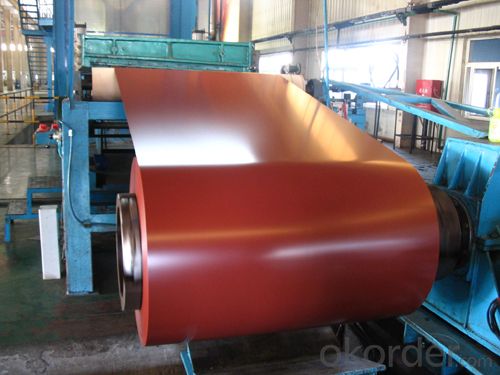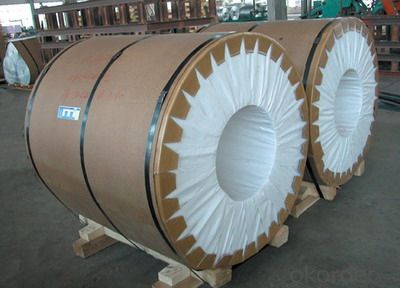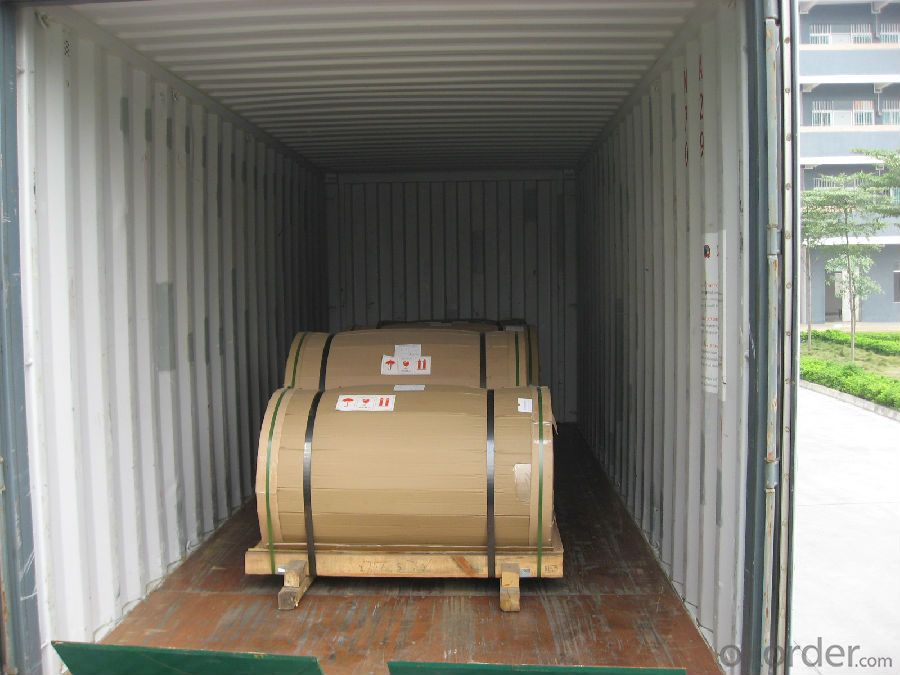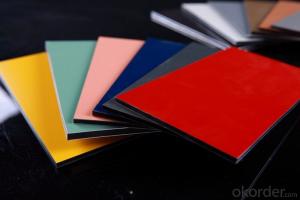Aluminium Coil with PVDF Coating Good Quality
- Loading Port:
- Shanghai
- Payment Terms:
- TT OR LC
- Min Order Qty:
- 8 m.t.
- Supply Capability:
- 2000 m.t./month
OKorder Service Pledge
OKorder Financial Service
You Might Also Like
Item specifice
Structure of Aluminium Coil with PVDF Coating Good Quality:
Coated aluminum coil/sheet are of a wide range of colors, which gives wonderful appearance no matter in residential and commercial constructions of great exhibition centers.
The coated aluminum coil/sheet have been widely used in the fields of construction and decoration( garage doors, ceiling etc.), electronic appliances, lighting decoration, air-condition air pipes, sandwich panels and drainages etc.
Main Features of Aluminium Coil with PVDF Coating Good Quality:
1) High flexibility
2) Impact resistance
3) Excellent weather-proof durability
4) Anti-ultraviolet
5) High erosion resist
Images of the Aluminium Coil with PVDF Coating Good Quality:



Aluminium Coil with PVDF Coating Good Quality Specification:
Alloy | A1100,A3003,A1050,A8011 etc |
Temper | H16,H18,H24 |
Thickness | From 0.024mm to 1.2mm |
Width | Standard width:1240mm |
Special width:1300mm,1520mm,1570mm,1595mm | |
Diameter | Standard dia:1200mm |
Interior dia:150mm,405mm,505mm | |
Weight | 2.5 T/coil,3.0 T/coil |
Coating | PE, PVDF, AC |
Surface | Embossed, mill finish, coated |
Color | AS to code RAL |
Gloss | 10-90%(EN ISO-2813:1994) |
Coating Thickness | PE: more than 18 micron |
PVDF: more than 25 micron | |
Coating Hardness (pencil resistance) | More than 2h |
Coating adhesion | 5J(EN ISO-2409:1994) |
Impact Resistance | No peeling or cracking(50 kg/cm,ASTMD-2794:1993) |
Flexibility (T-bend) | 2T |
MEK resistance | More than 100 |
FAQ Aluminium Coil with PVDF Coating Good Quality:
a.What is monthly capacity
---CNBM is one stated own company and our monthly capacity is about 2000tons.
b. Now which countries do you export your goods?
---Now we export to South East Asia,Africa, North America,South America ect.
- Q:How are aluminum coils processed for specific applications?
- Aluminum coils undergo a series of processes to tailor them for specific applications. The first step is the selection of high-quality aluminum alloy, which determines the coil's properties. Once the alloy is chosen, it is melted and cast into large ingots. After cooling, the ingots are rolled between heavy rollers to reduce their thickness and form long, continuous aluminum coils. Next, the coils are subjected to various surface treatments to enhance their performance and appearance. One common treatment is cleaning, which removes any impurities or contaminants from the coil's surface. This is typically done through chemical or mechanical methods. Another treatment is chemically etching the surface to create a specific texture or pattern, which can improve adhesion or aesthetics. To further enhance the coil's properties, it may undergo processes like heat treatment or annealing. Heat treatment involves heating the coil to a specific temperature and then rapidly cooling it to modify its mechanical or physical properties. Annealing, on the other hand, involves heating the coil to a predetermined temperature and then slowly cooling it to relieve internal stresses and improve its ductility. Coils destined for specific applications may also undergo additional processes. For instance, if the coil is intended for use in the automotive industry, it may be subjected to lubrication or coating processes to reduce friction or improve corrosion resistance. If it is meant for electrical applications, it might undergo surface treatments to enhance its conductivity or insulation properties. Finally, the coils are usually cut into desired lengths and packaged for transportation. This can be done through various methods like slitting, shearing, or sawing, depending on the application and customer requirements. Overall, the processing of aluminum coils for specific applications involves a combination of casting, rolling, surface treatment, heat treatment, and additional processes to enhance their performance, appearance, and suitability for their intended use.
- Q:Why does the coated aluminum coil have thickness requirement for membrane?
- The purpose of coating is to protect the surface of aluminum coil and make it more aesthetic. The thickness of membrane is closely related to the keep years of products made by aluminum coil.
- Q:Are aluminum coils suitable for outdoor applications?
- Yes, aluminum coils are suitable for outdoor applications. Aluminum is known for its excellent corrosion resistance, making it a popular choice for outdoor use. It is not prone to rust or deterioration when exposed to moisture, sunlight, or harsh weather conditions. Additionally, aluminum coils are lightweight, durable, and have a high strength-to-weight ratio, making them ideal for various outdoor applications such as roofing, gutters, air conditioning systems, and outdoor furniture. Moreover, aluminum is a highly recyclable material, making it an environmentally-friendly choice for outdoor projects. Overall, aluminum coils are a reliable and practical option for outdoor applications.
- Q:What is the maximum width-to-thickness ratio for aluminum coils?
- The maximum width-to-thickness ratio for aluminum coils depends on various factors, including the specific alloy, temper, and intended application. Aluminum coils are commonly used in industries such as construction, automotive, and packaging, where different width-to-thickness ratios may be required. In general, the width-to-thickness ratio for aluminum coils typically ranges between 100:1 to 200:1. However, it is important to note that this range can vary based on the specific alloy and temper. Thicker coils may have a lower width-to-thickness ratio, while thinner coils can have a higher ratio. High-strength alloys, such as those used in aerospace applications, may have lower width-to-thickness ratios due to their increased strength requirements. Conversely, coils used in less demanding applications may have higher width-to-thickness ratios. It is crucial to consult the relevant industry standards, specifications, or manufacturer guidelines to determine the appropriate width-to-thickness ratio for a specific aluminum coil. These guidelines consider the intended use, mechanical properties, and performance requirements, ensuring that the coil is suitable for its intended application while maintaining structural integrity and functionality.
- Q:i've been looking all over the internet for this information and i cant fin it! please help!what is aluminum's isotopic notation?what is aluminum's density at room temperature with units?what is aluminum's most common oxidation # ?aluminums e-dot diagram? symbol with valence electronschemical equation?enviornmental concers?
- isotopic okorder type environmental hazards of aluminum in the search bar and press search
- Q:I am sanding tool marks out of aluminum rims and plan on polishing them. Any help to make sanding them easier would be welcome.
- What kind of finish do they have? Brushed? High reflection? I think that if they are brushed, you may be able to use a steel wool. I'd get a second opinion on that (I'm no expert and my rims knowledge is probably outdated).
- Q:Are aluminum coils suitable for architectural roofing systems?
- Architectural roofing systems can indeed make use of aluminum coils. The popularity of aluminum as a roofing material stems from its many advantages. To begin with, aluminum is lightweight, making it easy to handle during installation and decreasing the burden on the building's structure. Furthermore, aluminum is highly durable and resistant to corrosion, ensuring that it will last for a long time as a roofing option. Its exceptional thermal properties are worth noting as well, as it can reflect heat and lead to reduced energy consumption. Another advantage is the ease with which aluminum coils can be molded and shaped into various profiles and designs, allowing for flexibility in architectural styles. Lastly, aluminum is an environmentally friendly choice for roofing systems, as it is both recyclable and sustainable. In conclusion, aluminum coils are a practical and suitable choice for architectural roofing systems, offering durability, versatility, and energy efficiency.
- Q:Can aluminum coils be used in the production of chemical storage tanks?
- Yes, aluminum coils can be used in the production of chemical storage tanks. Aluminum is a versatile and durable material that offers several advantages for chemical storage applications. It is corrosion-resistant, which makes it suitable for storing a wide range of chemicals. Additionally, aluminum is lightweight, which makes it easier to transport and install compared to other materials like steel. It is also non-magnetic, which can be beneficial in certain applications. However, it is important to consider the specific requirements of the chemicals being stored and consult with experts or manufacturers to ensure that aluminum is the appropriate choice for the intended use.
- Q:Are aluminum coils suitable for lightweight applications?
- Yes, aluminum coils are suitable for lightweight applications. Aluminum is known for its low density and high strength-to-weight ratio, making it an ideal choice for lightweight applications where weight reduction is crucial, such as in the automotive, aerospace, and packaging industries.
- Q:What are the different thicknesses available for aluminum coils?
- Aluminum coils are available in various thicknesses to cater to different application requirements. The thickness options typically range from 0.2mm to 6mm. The specific thickness needed depends on the intended use of the aluminum coil. Thinner coils, such as those with a thickness of 0.2mm to 1mm, are often used in electronics, packaging, and building materials where flexibility and lightweight properties are important. Medium thickness coils, ranging from 1mm to 3mm, are commonly employed in automotive parts, roofing, and cladding applications. On the other hand, thicker aluminum coils, with a thickness of 3mm to 6mm, are utilized in heavy-duty industrial applications like shipbuilding, aerospace, and construction. It is important to consider the specific requirements and intended use of the aluminum coil to determine the most suitable thickness for the desired application.
1. Manufacturer Overview |
|
|---|---|
| Location | |
| Year Established | |
| Annual Output Value | |
| Main Markets | |
| Company Certifications | |
2. Manufacturer Certificates |
|
|---|---|
| a) Certification Name | |
| Range | |
| Reference | |
| Validity Period | |
3. Manufacturer Capability |
|
|---|---|
| a)Trade Capacity | |
| Nearest Port | |
| Export Percentage | |
| No.of Employees in Trade Department | |
| Language Spoken: | |
| b)Factory Information | |
| Factory Size: | |
| No. of Production Lines | |
| Contract Manufacturing | |
| Product Price Range | |
Send your message to us
Aluminium Coil with PVDF Coating Good Quality
- Loading Port:
- Shanghai
- Payment Terms:
- TT OR LC
- Min Order Qty:
- 8 m.t.
- Supply Capability:
- 2000 m.t./month
OKorder Service Pledge
OKorder Financial Service
Similar products
New products
Hot products
Related keywords






























